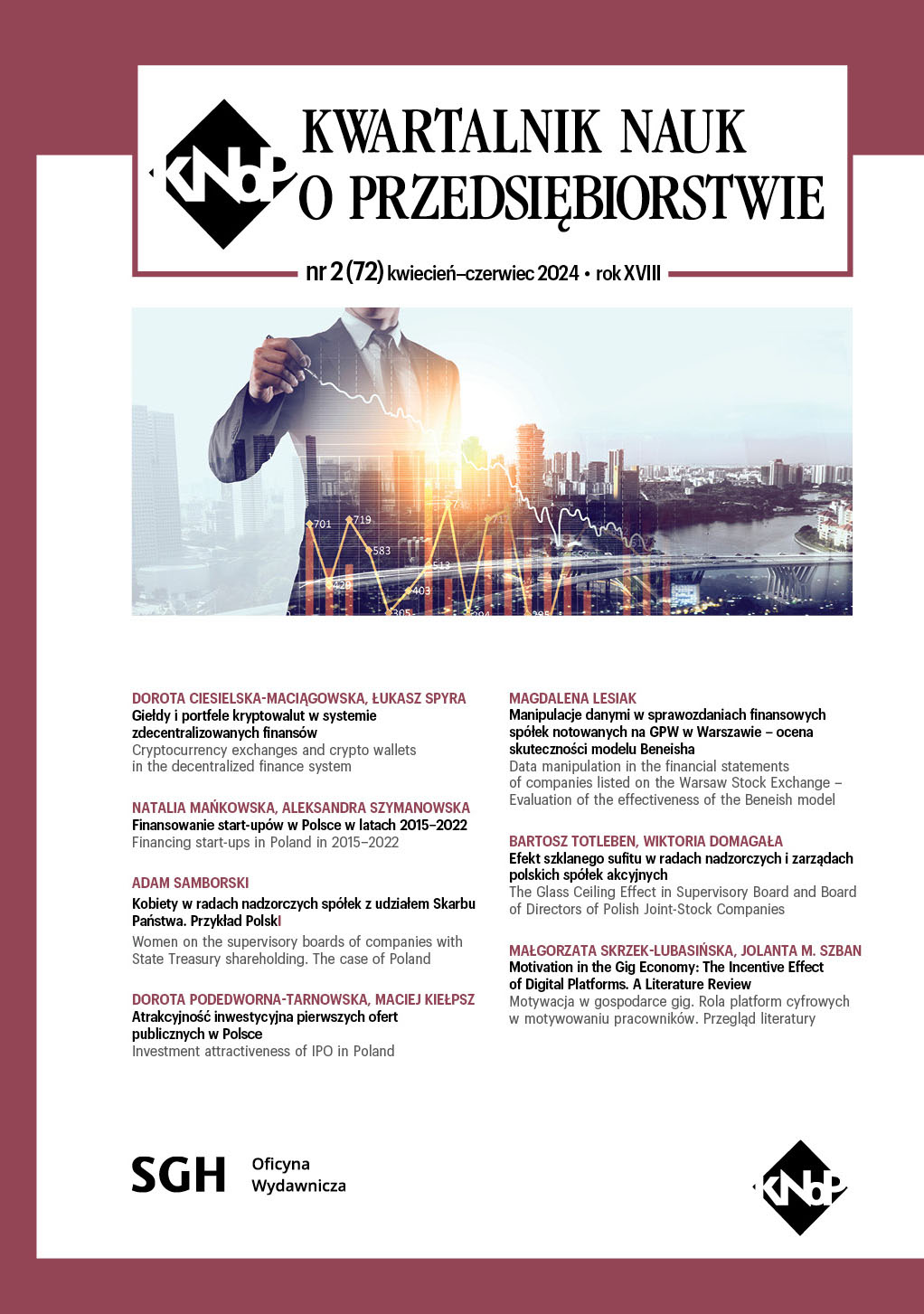Finansowanie start-upów w Polsce w latach 2015–2022
Main Article Content
Abstrakt
Celem niniejszego artykułu było zidentyfikowanie źródeł finansowania start-upów w Polsce w latach 2015–2022. Dane te zostały porównane z sytuacją w zakresie źródeł finansowania start-upów w innych krajach UE i OECD. Jako metodę badawczą zastosowano metodę analizy dokumentów oraz wykorzystano statystyki opisowe. Badanie przeprowadzono opierając się na ogólnodostępnych danych z raportów i witryn internetowych. Najważniejsze wnioski uzyskane z badania wskazują, że w wybranym okresie start-upy w Polsce korzystały z różnorodnych źródeł kapitału. W kontekście poszczególnych źródeł wpływ na ich wykorzystanie miała pandemia COVID-19. Krajowe źródła kapitału były wykorzystywane w większym stopniu, niż ich zagraniczne odpowiedniki. W Polsce start-upy finansowane są najczęściej środkami własnymi, nie odróżnia to naszego kraju od innych krajów UE lub OECD. W przypadku analizowanych danych brakuje danych na temat finansowania w Polsce FFF wykorzystywanego przez start-upy.
Downloads
Article Details

Utwór dostępny jest na licencji Creative Commons Uznanie autorstwa 4.0 Międzynarodowe.
Autor (Autorzy) artykułu oświadcza, że przesłane opracowanie nie narusza praw autorskich osób trzecich. Wyraża zgodę na poddanie artykułu procedurze recenzji oraz dokonanie zmian redakcyjnych. Przenosi nieodpłatnie na Oficynę Wydawniczą SGH autorskie prawa majątkowe do utworu na polach eksploatacji wymienionych w art. 50 Ustawy z dnia 4 lutego 1994 r. o prawie autorskim i prawach pokrewnych – pod warunkiem, że praca została zaakceptowana do publikacji i opublikowana.
Oficyna Wydawnicza SGH posiada autorskie prawa majątkowe do wszystkich treści czasopisma. Zamieszczenie tekstu artykuły w repozytorium, na stronie domowej autora lub na innej stronie jest dozwolone o ile nie wiąże się z pozyskiwaniem korzyści majątkowych, a tekst wyposażony będzie w informacje źródłowe (w tym również tytuł, rok, numer i adres internetowy czasopisma).
Osoby zainteresowane komercyjnym wykorzystaniem zawartości czasopisma proszone są o kontakt z Redakcją.
Bibliografia
Arwaj A., Dziewit W., Jagieło K., Jedliński K., Król P., Pawlak M., Snażyk T. [2020], Polskie startupy 2020. COVID Edition, Fundacja Startup Poland, Warszawa.
Beauchamp M., Kowalczyk A., Skala A. [2017], Polskie startupy. Raport 2017, Fundacja Startup Poland, Warszawa.
Beauchamp M., Krzysztofiak-Szopa J., Skala A. [2018], Polskie startupy. Raport 2018, Fundacja Startup Poland, Warszawa.
Białek R., Nowak R. [2018], Uwarunkowania rozwoju start-upów w Polsce, „Zeszyty Naukowe Wyższej Szkoły Ekonomii i Innowacji w Lublinie, Seria: Ekonomia”, nr 1.
Blank S., Dorf B. [2013], Podręcznik startupu. Budowa wielkiej firmy krok po kroku, Helion, Gliwice.
Boyer D., Creech H., Paas L. [2008], Report for SEED Initiative Research Programme: Critical success factors and performance measures for start-up social and environmental enterprises, International Institute for Sustainable Development, s. 22–30.
Brunello A. [2016], Crowdfunding. Podręcznik, CeDeWu, Warszawa.
Dziewit W. [2021], Polskie startupy 2021, Fundacja Startup Poland, Warszawa.
Dziewit W. [2022], Polskie startupy 2022, Fundacja Startup Poland, Warszawa.
Dziuba D. T. [2012], Rozwój systemów crowdfundingu – modele, oczekiwania i uwarunkowania, „Problemy Zarządzania”, t. 10, nr 3 (38), s. 83–103.
EU Startup Monitor. Growing Businesses in Europe, http://startupmonitor.eu/ (data dostępu: 29.05.2023; 30.05.2023).
EVCA [2007], Guide on Private Equity and Venture Capital for Entrepreneurs, An EVCA Special Paper, European Private Equity and Venture Capital Association, Brussels
Gwyther M. [1999], Jewels in the web, Management Today, listopad, s. 63–69.
Iwaszczuk N. [2019], Innowacyjność w działalności gospodarczej, IGSMiE PAN, Kraków.
Krysztofiak-Szopa J., Wisłowska M. [2019], Polskie startupy. Raport 2019, Fundacja Startup Poland, Warszawa.
Kuti M., Madarász G. [2014], Crowdfunding, Public Finance Quarterly, s. 355–387.
Love H. [2016], The Start-Up J Curve: The Six Steps to Entrepreneurial Success, Greenleaf Book Group Press, Austin.
Malinowski B. F., Giełzak M. [2015], Crowdfunding. Zrealizuj swój pomysł ze wsparciem cyfrowego tłumu, Helion, Gliwice.
McKinsey&Company [2023], Fueling the Hungarian start-up ecosystem, McKinsey Global Publishing, January 31, https://www.mckinsey.com/featured-insights/europe/fueling-the-hungarianstart-up-ecosystem#/ (data dostępu: 12.07.2023).
Mikołajczyk K., Nawojowicz D. [2013], Start-up po polsku. Jak założyć i rozwinąć dochodowy e-biznes, Wydawnictwo Onepress, Gliwice.
Nawrot W. [2007], Struktura finansowa przedsiębiorstw w Polsce na tle badań międzynarodowych, „Gospodarka Narodowa”, nr 7–8, s. 19–42.
NBP [2015], Kredyt bankowy jako źródło finansowania działalności, Narodowy Bank Polski, Rzeszów.
Nieć M. [2019], Startupy w Polsce 2019, Polska Agencja Rozwoju Przedsiębiorczości, Warszawa.
Nielsen N. H. [2018], Finansowanie startupów. Poradnik przedsiębiorcy, Wydawnictwo Onepress, Gliwice.
OECD, https://data.oecd.org/ (data dostępu: 29.05.2023; 30.05.2023).
PFR, https://poland.dealroom.co (data dostępu: 15.05.2023; 31.05.2023).
Ries E. [2012], Metoda Lean Startup. Wykorzystaj innowacyjne narzędzia i stwórz firmę, która zdobędzie rynek, Helion, Gliwice.
Skala A., Kruczkowska E. [2016], Polskie startupy. Raport 2016, Warszawa, Fundacja Startup Poland.
Skala A., Kruczkowska E., Olczak M. A. [2015], Polskie startupy. Raport 2015, Warszawa, Fundacja Startup Poland.
Sudok R. [2006], Angel Investment Criteria, „Journal of Small Business Strategy”, vol. 17 (2).
The top 12 reasons startups fail [2021], CB Insights, August 3, https://www.cbinsights.com/research/startup-failure-reasons-top/ (data dostępu: 14.07.2023).
Ustawa z dnia 20 lipca 2018 r. Prawo o szkolnictwie wyższym i nauce (t.j. Dz.U. 2022, poz. 574 ze zm.).
Wieczorek M. [2017], Prawo dla startupu, Wydawnictwo Onepress, Gliwice.
Włodarska-Zoła L. [2016], Venture capital jako źródło finansowania przedsięwzięć innowacyjnych w świetle polityki wspierania innowacyjności, „Prace Naukowe Uniwersytetu Ekonomicznego we Wrocławiu”, nr 436, s. 278–286.
Wojtas S., Senecki A., Spysz A., Frączek M. [2015], Katalog polskiego ekosystemu startupowego, Polska Agencja Rozwoju Przedsiębiorczości, Warszawa.

